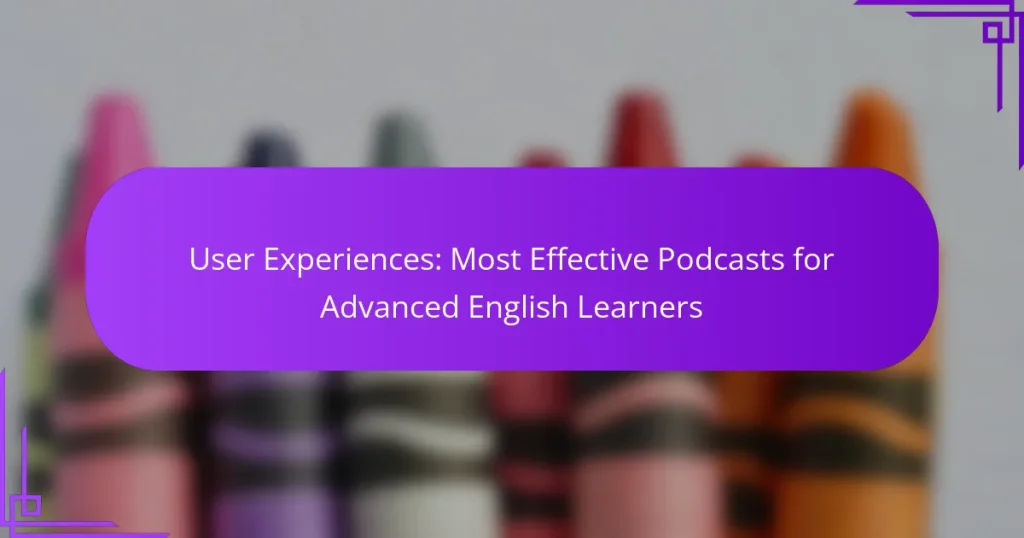For advanced English learners, the most effective podcasts offer a blend of engaging content and insights into language nuances and culture. These audio experiences not only enhance vocabulary and comprehension but also immerse listeners in natural speech patterns and diverse accents, fostering a deeper understanding of the language.
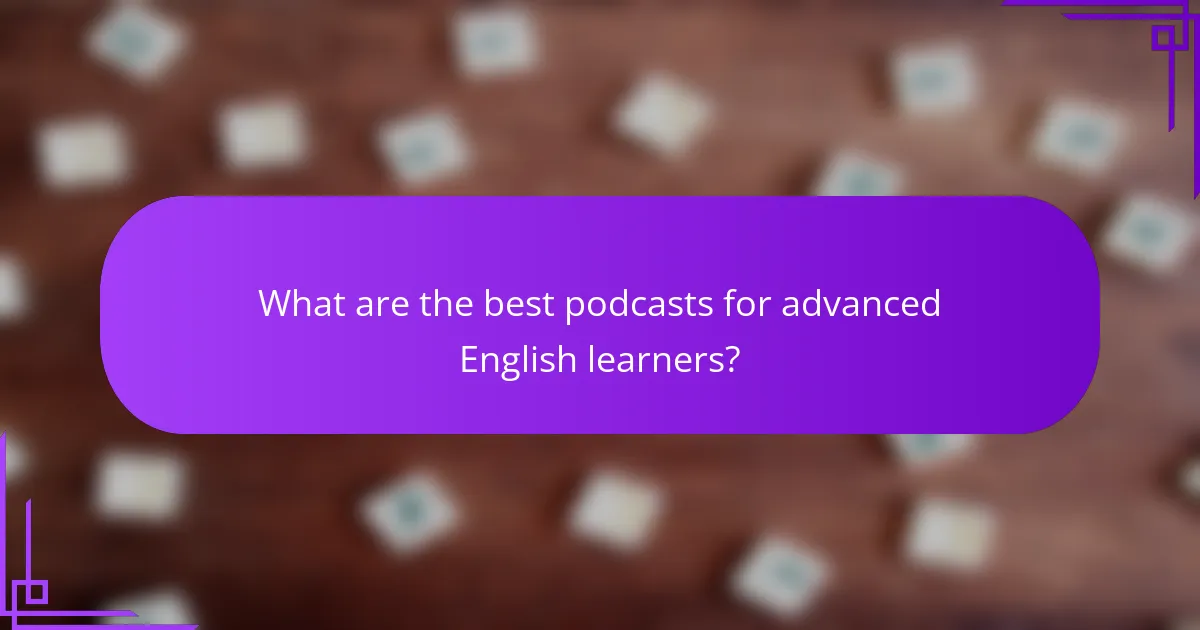
What are the best podcasts for advanced English learners?
The best podcasts for advanced English learners combine engaging content with a focus on language nuances and cultural insights. These shows help learners enhance their vocabulary, comprehension, and conversational skills through real-world discussions and expert interviews.
The English We Speak
The English We Speak is a podcast by the BBC that introduces listeners to idiomatic expressions and phrases commonly used in British English. Each episode is short, typically around three minutes, making it easy to fit into a busy schedule.
This podcast is particularly beneficial for advanced learners looking to sound more natural in their speech. It provides context for each phrase, helping listeners understand when and how to use them effectively.
BBC Learning English
BBC Learning English offers a variety of programs tailored for advanced learners, including news reports, discussions, and grammar tips. The content is designed to improve listening skills while expanding vocabulary and understanding of complex structures.
With episodes ranging from five to fifteen minutes, learners can choose topics that interest them, making the learning process more enjoyable. The podcast also includes transcripts, which are useful for following along and reinforcing comprehension.
All Ears English
All Ears English focuses on American English and cultural insights, making it ideal for learners who want to understand everyday conversations. The hosts discuss various topics, from travel to social issues, while emphasizing practical language use.
Episodes typically last between 20 and 30 minutes, allowing for in-depth discussions. Advanced learners can benefit from the tips on improving fluency and understanding American idioms and slang.
Grammar Girl
Grammar Girl provides quick and easy tips on grammar, punctuation, and style, making it a valuable resource for advanced learners looking to refine their writing skills. Each episode is concise, usually around 10 minutes, focusing on specific grammar topics.
This podcast is particularly useful for those preparing for academic writing or professional communication. It offers practical examples and common pitfalls to avoid, enhancing overall language proficiency.
Speak English Now
Speak English Now is designed to help learners improve their speaking skills through storytelling and conversation practice. The host uses a method that emphasizes listening and repeating, which can be effective for advanced learners aiming to enhance fluency.
Episodes vary in length but generally last around 15 to 20 minutes. The focus on real-life scenarios helps learners apply what they’ve learned in practical situations, making it easier to transition from theory to conversation.
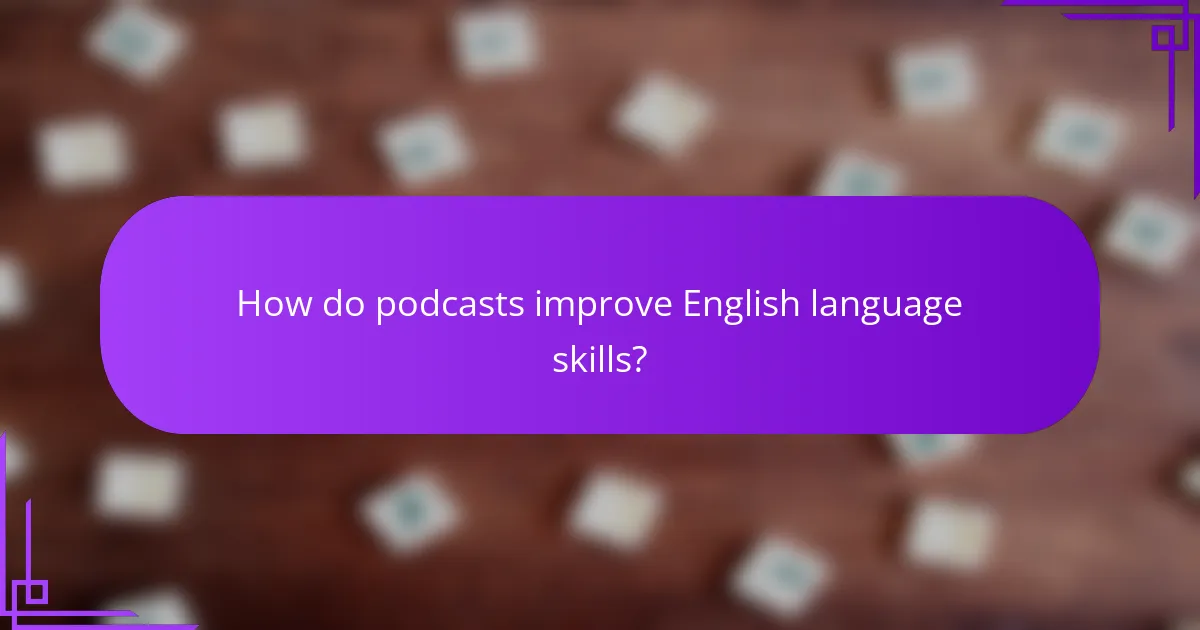
How do podcasts improve English language skills?
Podcasts enhance English language skills by providing immersive listening experiences that expose learners to natural speech patterns, diverse accents, and contextual vocabulary. This auditory engagement fosters a deeper understanding of the language, making it easier to grasp nuances and idiomatic expressions.
Enhances listening comprehension
Podcasts improve listening comprehension by presenting authentic dialogues and discussions that reflect real-life conversations. This exposure helps learners develop the ability to understand various accents and speech rates, which are often challenging in traditional learning environments.
To maximize comprehension, choose podcasts that match your current proficiency level. Start with slower-paced shows or those designed for language learners, then gradually progress to more complex content. Actively listening while taking notes can also reinforce understanding.
Expands vocabulary
Podcasts are an excellent resource for expanding vocabulary as they introduce listeners to new words and phrases in context. This contextual learning helps learners remember and use vocabulary more effectively compared to rote memorization.
To enhance vocabulary acquisition, consider keeping a vocabulary journal where you jot down new words along with their meanings and example sentences. Regularly revisiting these entries can reinforce learning and facilitate retention.
Improves pronunciation
Listening to native speakers in podcasts allows learners to hear correct pronunciation and intonation, which is crucial for effective communication. Mimicking these sounds can significantly improve one’s own speaking skills.
For practical improvement, pause the podcast after sentences or phrases and repeat them aloud. This practice not only helps with pronunciation but also builds confidence in speaking. Additionally, using apps that provide feedback on pronunciation can further refine your skills.
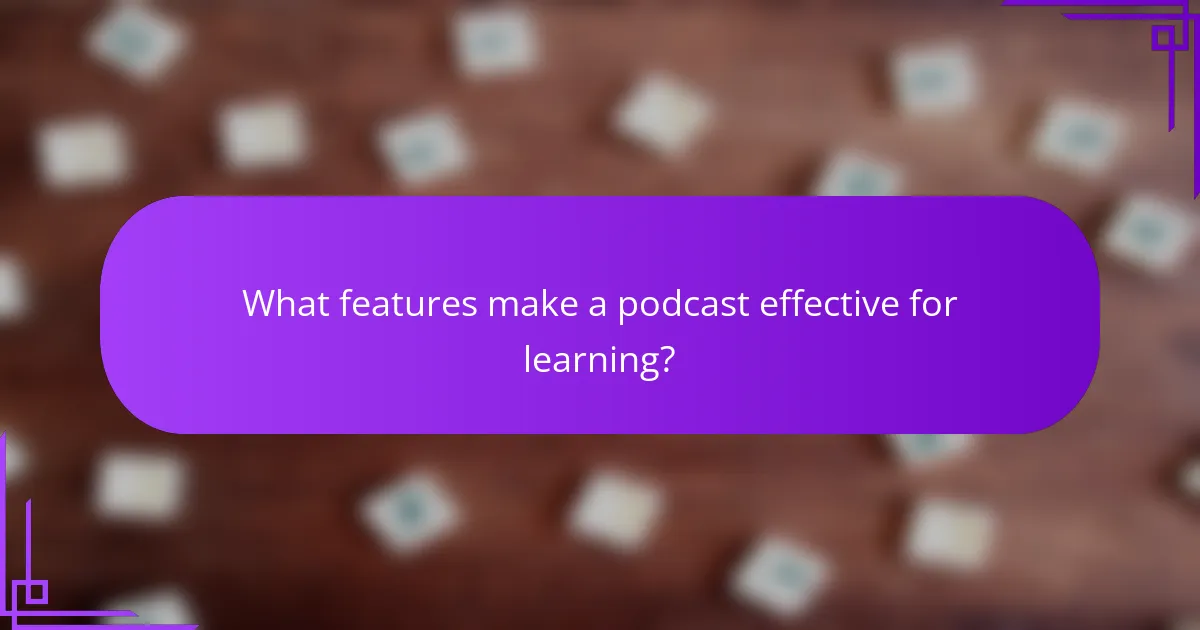
What features make a podcast effective for learning?
An effective podcast for learning should prioritize clear audio quality, engaging content, and structured lessons. These features enhance comprehension and retention, making it easier for advanced English learners to improve their skills.
Clear audio quality
Clear audio quality is essential for effective learning through podcasts. If the sound is muffled or distorted, it can hinder understanding and make it difficult to follow along. Look for podcasts that use high-quality recording equipment and have minimal background noise.
When evaluating audio quality, consider the format of the podcast. Many successful educational podcasts use a mix of interviews, discussions, and narration, which can help maintain clarity. A good rule of thumb is to choose podcasts with a consistent volume level and clear enunciation.
Engaging content
Engaging content keeps learners interested and motivated. Podcasts that incorporate storytelling, real-life examples, or expert interviews tend to resonate more with listeners. This type of content can make complex topics more relatable and easier to grasp.
To find engaging podcasts, look for those that cover subjects of personal interest or relevance to your goals. Additionally, podcasts that encourage listener interaction, such as Q&A sessions or community discussions, can enhance the learning experience by making it more dynamic.
Structured lessons
Structured lessons provide a clear framework for learning, helping listeners to follow along and absorb information effectively. Podcasts that outline their episodes with specific learning objectives or key takeaways can significantly enhance comprehension.
When selecting a podcast, consider those that break down topics into manageable segments. For instance, a podcast might dedicate each episode to a specific theme or skill, allowing learners to build their knowledge progressively. Look for shows that offer supplementary materials, such as transcripts or quizzes, to reinforce learning.

How can I integrate podcasts into my learning routine?
Integrating podcasts into your learning routine can enhance your English skills through consistent exposure to the language. By incorporating daily listening, effective note-taking, and engaging in discussion groups, you can significantly improve your comprehension and speaking abilities.
Daily listening practice
Establishing a daily listening habit is crucial for advanced English learners. Aim for at least 30 minutes of podcast listening each day, selecting topics that interest you to maintain motivation. Consider using a variety of podcast genres, such as news, storytelling, or interviews, to expose yourself to different accents and vocabulary.
To track your progress, keep a listening log where you note down the episodes you’ve completed and any new vocabulary or phrases you encounter. This will help reinforce your learning and provide a reference for future review.
Note-taking strategies
Effective note-taking can enhance retention and understanding while listening to podcasts. Use a structured format, such as the Cornell method, to organize key points, vocabulary, and personal reflections. Highlight any phrases or expressions that stand out to you, as these can be useful in your own speaking and writing.
Consider summarizing each episode in your own words after listening. This practice not only reinforces comprehension but also helps you articulate your thoughts in English more clearly.
Discussion groups
Joining a discussion group can provide a platform to practice speaking and deepen your understanding of podcast content. Look for local or online groups focused on English learning where members discuss episodes and share insights. This interaction can help you gain different perspectives and improve your conversational skills.
When participating in discussions, prepare by jotting down your thoughts and questions about the podcast beforehand. This preparation will enable you to contribute meaningfully and engage more effectively with other learners.
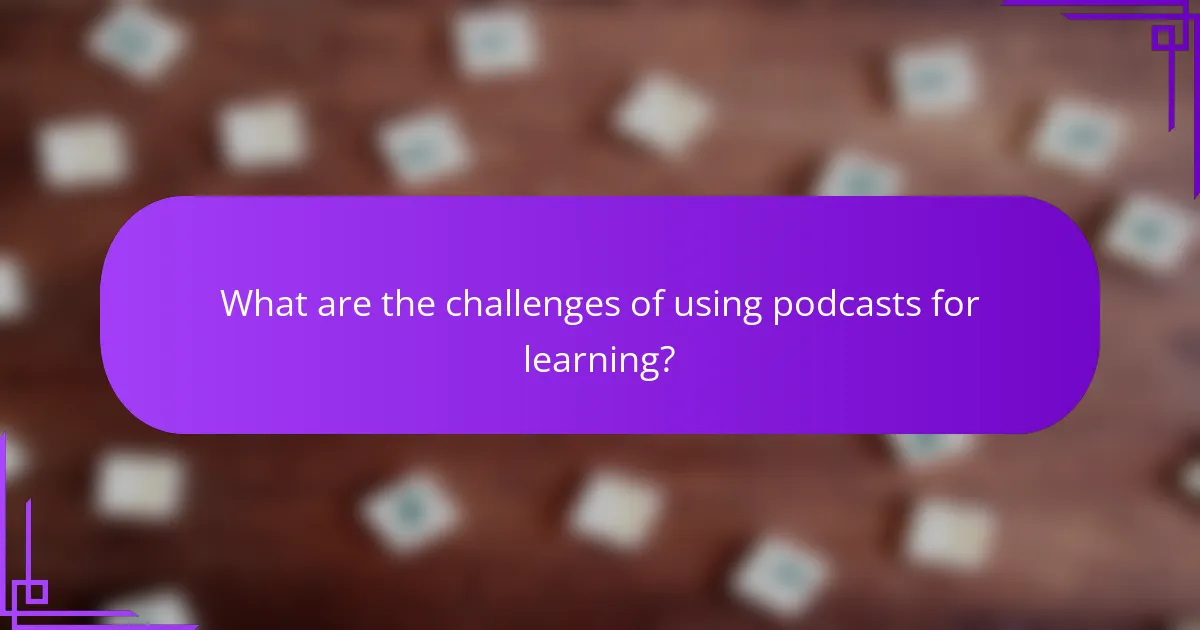
What are the challenges of using podcasts for learning?
Podcasts can be a valuable tool for advanced English learners, but they come with challenges that can hinder effective learning. Key issues include understanding different accents, maintaining motivation, and finding suitable content that aligns with learning goals.
Understanding different accents
Advanced English learners often encounter a variety of accents in podcasts, which can make comprehension difficult. Exposure to diverse pronunciations and dialects is beneficial, yet it may lead to confusion if learners are not accustomed to them. To improve understanding, learners should listen to podcasts that feature speakers from different regions and practice active listening techniques.
Maintaining motivation
Staying motivated while learning through podcasts can be challenging, especially when content becomes repetitive or unengaging. To combat this, learners should set specific goals, such as listening to a certain number of episodes per week or focusing on particular topics of interest. Engaging with podcast communities or discussion groups can also enhance motivation by providing social interaction and accountability.
Finding suitable content
Identifying podcasts that match language proficiency and learning objectives is crucial for effective learning. Advanced learners should seek out content that challenges them without being overwhelming. Resources like podcast directories or language learning forums can help in discovering high-quality podcasts tailored to specific interests, such as technology, culture, or current events.
